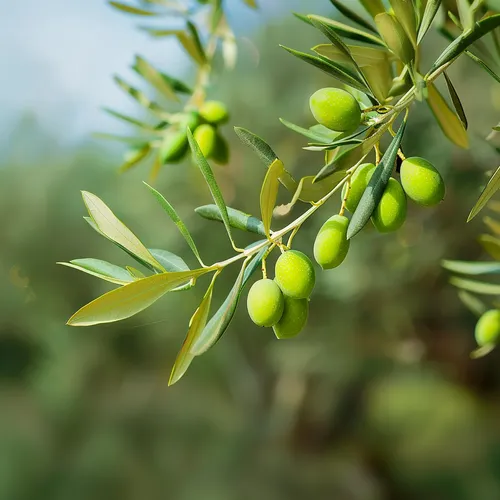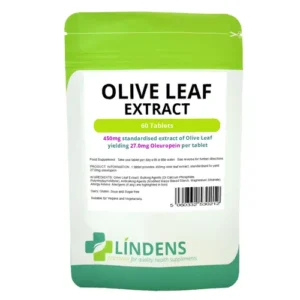In the Mediterranean and many other parts of the world, olives are considered to be a staple food. They are inexpensive, plentiful, and used in just about every meal.
Extra-virgin olive oil is made from the very first pressing of olives, and is a vital part of any chef’s kitchen. It is considered to be a vital component in the overall health of those who consume the Mediterranean diet. The oil is delicious, versatile, easy to cook with, and has excellent reputation as a healthy part of any diet.
However the olive itself is not the only part of the Olive plant to offer health benefits. The olive leaf is an age old medicinal herb with therapeutic uses that have been known for centuries.
Ancient Egyptians believed the olive leaf had powers from the gods themselves, and the leaf was a critical component of the mummification process. In Morocco, an olive leaf infusion is often given to help stabilise blood sugar levels in diabetics. A number of studies have been published that support this use.
In modern times, the olive leaf is becoming increasingly well-known around the world as science discovers more healthy uses.
Why Is Olive Leaf so Good for Us?
Scientists have identified a apecific molecule that gives olive oil with its variety of health and life-extending benefits. The molecule is called oleuropein and it is a polyphenol that may help reduce bad cholesterol, lower blood pressure, help prevent cancer, guard against oxidative damage, and help protect against cognitive decline.
Oleuropein was discovered in the early 1900s and has been attracting attention ever since. Oleuropin is classified as an iridoid with antibacterial, antifungal, and antiviral properties, making it useful in the fight against internal infections. The compound stimulates the body to produce thermogenin, a substance that speeds fat burning.
Studies have shown oleuropein to be effective in lowering blood pressure. Other studies have shown it to be a powerful antioxidant, effectively blocking oxidation of lipids and reducing cardiovascular disease. It has also been shown to protect against breast cancer.
According to some studies, olive leaf is an even more powerful antioxidant than green tea. A number of studies have found that antioxidants found in plants offer a variety of health benefits, and reduce the occurrence of both chronic and degenerative diseases.
Olive Leaf Can Help Combat Cancer
Olive leaf is an excellent source of apigenin and luteiolin, compounds that have been shown to fight cancer, as well as cinchonine, a substance used to treat malaria.
Olive leaf extract also contains anti-inflammatory compounds. Along with oxidation; inflammation is a prime component in many chronic and degenerative conditions. Studies indicate that olive leaf extract may help protect nerves against damage and may be helpful for stroke victims.
As is the case with many medicinal plants, olive leaf was used medicinally for centuries before science began to support it. Olive leaf has been considered to be something of a cure-all tonic for centuries, and now science is showing that it can indeed promote overall health and help reduce the risk of a number of serious health issues.
Although the benefits of olive leaf are less well-known than those of the fruits and the oil extracted from them, science is increasingly learning that the ancient reputation of olive leaf is well-deserved.
Olive Leaf Can Help Reduce Blood Pressure
Studies in animals show that olive leaf extracts can help to to both prevent and treat high blood pressure. This happens either before or after the animals develop hypertension, which is remarkable!
Reduced pressure in the heart’s left ventricle was an additional bonus that accompanied the drop in blood pressure in the study, which resulted in a much better blood flow to the hearts coronary blood vessels. Further studies, this time in humans, have shown that olive leaf extracts can significantly reduce blood pressure measurements.
Olive Leaf Can Improve Our Arterial Health
When it comes to cardiovascular health, blood pressure is just one measure. Arterial health is just as important.
In the heart constant and regulated blood flow and pressure is handled by the endothelial cells that line arterial walls. They also organise the distribution of smooth muscle cells and manage an even flow of blood through vessels. When hardening of the arteries (atherosclerosis), takes place, endothelial dysfunction is one of the first stages. It takes place when plaques build up in the arterial walls. These plaques cause blood flow to be blocked and can cause a heart attack or stroke.
Olive leaf extracts help combat endothelial dysfunction at many levels. They improve the production of nitric oxide, a signalling molecule that aids the relaxation of blood vessels. They also lower the production and activity of a group of molecules known as matrix metalloproteinases (MMP). Too much MMP activity can dissolve the gel-like matter that keeps cells together, increasing the vulnerability of vessel linings to plaque damage. They also help stop the oxidation of LDL-cholesterol, which is one of the first stages in developing atherosclerosis.
Olive Leaf Extract and Arthritis
The extract of olive leaf has been valued as a traditional remedy for arthritis. Scientific research is now backing up this history. The plant can in fact interfere with the advancement of several different types of arthritis, such as gout, rheumatoid arthritis and osteoarthritis.
Gout is a result of the accumulation of uric acid crystals in joints. Oleuropein can prevent the build-up of uric acid by inhibiting the activity of the enzyme that causes DNA and RNA to be converted into uric acid. Oleuropein has also been shown to help stop and alleviate the symptoms of rheumatoid arthritis and osteoarthritis.
Olive Leaf Can Help Us Combat Diabetes
The chronic blood sugar elevation that is associated with diabetes causes substantial oxidative stress throughout the body, setting off inflammation and tissue damage that rapidly speeds up ageing.
Treatments for diabetes have two primary aims:
- to reduce blood glucose to normal levels
- to restrict the damage done by the inevitable blood sugar spikes that still take place
In both of these areas, olive leaf extracts have been shown to be particularly useful.
Various studies have shown that olive leaf extracts and oleuropein can reduce blood sugar in several ways. Firstly they can slow the digestion of starches into simple sugars. The absorption of these sugars from the intestine can also be slowed. Secondly, they can increase the uptake of glucose into tissues from the blood.
Olive leaf extracts can help protect tissues from the oxidant damage caused by glycation – the process when glucose binds to proteins. They also raise levels of other natural antioxidant systems in the body, widening the degree of protection.
Animal studies have shown that significant reductions in blood sugar and cholesterol can be attributed to a diet supplemented by olive leaf extracts. Studies in humans show that taking a supplement of 500 mg of olive leaf extract every day caused significant reductions in haemoglobin A1c levels, this being the standard marker of extended exposure to raised blood sugar in people with diabetes.
Why You Should Consider Taking Olive Leaf Extracts
Convincing scientific evidence now proves that olive leaf extracts, being oleuropein-rich, can help stop many of the underlying causes of cancer, diabetes, stroke, neurodegenerative diseases and arthritis. Because of this, extra-virgin olive oil and olive leaf extract should be considered a vital part of your health and longevity program.
How to Take Olive Leaf Extract
Olive leaf extract is available in several forms, including capsules, tablets, and liquid tinctures. A typical dose is 500-1000 mg per day. It’s best to start with a lower dose and gradually increase as needed. Look for supplements standardised to contain at least 20% oleuropein for maximum potency.
Potential Side Effects and Interactions
Olive leaf extract is generally well tolerated, but may cause mild side effects like stomach upset in some people. It can interact with certain medications, including blood pressure drugs, so check with your doctor before taking it if you have any medical conditions or take prescription medications. Pregnant and nursing women should avoid olive leaf extract due to lack of safety data.
Photo “Olives” by Anthony Cunningham for Zoom Health
Zoom Health is a leading UK supplier of Home Health Tests and Earplugs






